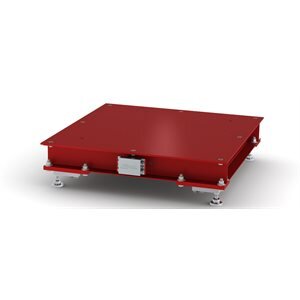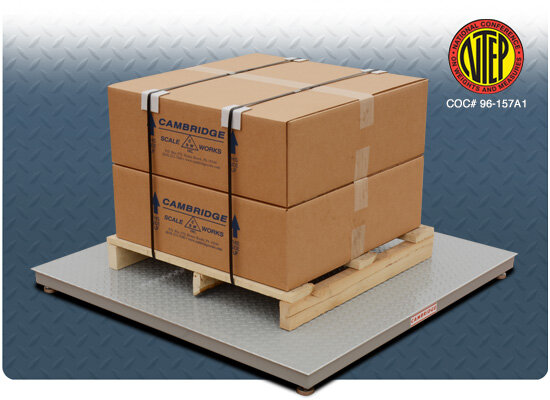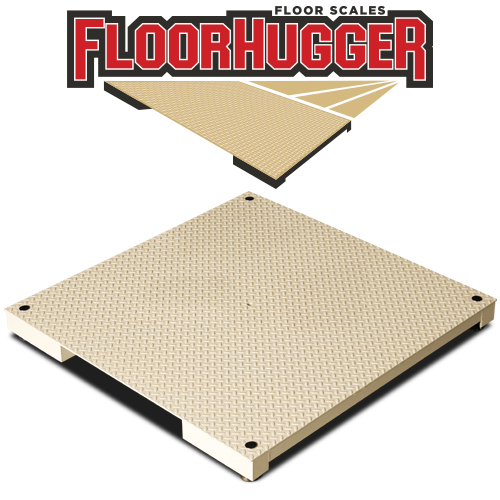Floor scales are large weighing platforms capable of withstanding heavy duty weighing and rough conditions. Floor scales can be used to weigh many things such as pallets and heavy items. They come in a couple of different forms and dimensions and represent any sort of weighing equipment that operates on floor level. This includes pallet scales, platform scales, and pallet beams. Understanding what kind of quality and dimensions of floor scales that are available is important to understanding the cost of a floor scale. There are basic floor scales ranging in size from 3x3 to 5x5 with 1,000 lb - 20,000 lb capacity. A good quality, mild steel standard floor scale will cost anywhere between $800 - $2,000. A good quality stainless steel floor scale will cost anywhere between $2,000 to $10,000 depending on what size and weight capacity you buy, not including installation and shipping fees.
TYPES OF FLOOR SCALES
· Material- Stainless Steel or Mild Steel
· Power Type- Electronic or Hydraulic
· Gas-assisted lift deck or no lift deck
· Pit mounted or not
As previously mentioned, stainless-steel floor scales are more expensive and are typically used for more wet, heavy duty conditions. Many of these scales will have a quick clean application through gas-assisted lift decks. These steel decks can easily fold up and allow for cleaning under the scale. These scales are typically found in applications such as food processing, where the scale is going to need to be washed down from time to time to ensure sanitation. Other applications that do not require clean downs probably do not need a lift deck floor scale.
To save space, many customers will opt for a pit-mounted floor scale, where the floor scale will be installed in a pit so that the scale will be right at floor level. This will allow for easy transportation of items onto the scale. The cost of digging out a pit in concrete floors is roughly between $2,500 to $5,000 depending on the size and if a drainage system were to be installed under the scale. Keep in mind that this an additional cost incurred on top of the purchase of the floor scale. You may have to hire a contractor to cut out the dimensions of the pit. The other option is to buy a ramp to put adjacent to the floor scale. This will also cost money and will take up more space than the pit-mounted scale.
Another type of floor scale that is less common is the hydraulic floor scale. These scales provide great protection from the harshest of conditions. While more expensive, Hydraulic scales offer great protection in messy environments that require impervious weighing solutions. A Hydraulic Floor Scale’s cost will vary depending on type (stainless steel or mild steel) and dimension, but generally hydraulic floor scales will fall in the range of $9,000 to $25,000. Hydraulic scales require a special certification to work on them, as they operate differently from electronic scales. This also contributes to the higher price tag.
FLOOR SCALE QUALITY CONSIDERATIONS
When purchasing a floor scale, it is very important that you look for quality rather than opting for a lower quality scale. In truth, lower quality floor scales will probably cost around $400-$800 and may seem like a bargain, but will probably not withstand the test of time and general wear-and-tear. Buying a floor scale from a non-reputable source may end up costing you more time and money in the long run. The cost of replacing or recalibrating these unreliable scales will ultimately equate to the cost of buying a higher-quality, more expensive scale, therefore cheap floor scales are not worth the risk. Also factor in the use of a remote display or scoreboard as well to help with convenience.
FLOOR SCALE LOAD CELLS
Floor scales typically have 4 load cells under a deck which is situated on top of the load cells. These cells can hold up to 10,000 lbs but typically hold between 1,000 to 5,000 lbs in weight. You can go analog or electronic load cells, scale calibration will be the same. The load cells will all run to a junction box that sums the individual load cell weights. The more weight capacity that the load cells hold, the more the floor scale will cost. An individual load cell used in a floor scale will typically cost around $200 to $700, depending on its weight capacity. Make sure you know how much capacity you need before purchasing a floor scale. A rule of thumb is that the net weight of all 4 load cell capacities divided in half is the capacity of the entire floor scale. So for example, if you have four 2,500 lb capacity load cells in your floor scale, that would be 10,000 lbs divided by 2, equaling a 5,000 lb floor scale capacity.
NTEP/ LEGAL FOR TRADE CONSIDERATIONS
Typically, if a scale is used in an exchange that involves buying, selling, or charging based on weight within the United States, it must be legal for trade certified. NTEP (National Type Evaluation Program), a non-profit corporation, will usually test and approve scales so that they can be considered “legal for trade”. Not all floor scales are NTEP certified so be aware of that. More reliable scale manufacturers such as Cardinal, B-Tek, Rice Lake, and Emery Winslow offer NTEP certified, legal for trade scales. It is important to understand how you will be using your floor scale; if it is being used to sell or buy something on the basis of weight then you must make sure you floor scale is legal for trade certified, which is typically done through NTEP certification. American Scale offers a wide array of NTEP certified floor scales.
CONCLUSION
As previously mentioned, there are other costs attached to buying a floor scale, as well as many different options of floor scales available for purchase. Make sure to do your due diligence so that you choose the floor scale that will best suite your weighing needs.
Closing Words
At American Scale we strive to bring you informed and useful content on all things scale related. Be sure to check out our legal for trade truck scale system articles about truck scale foundation or how much do truck scales cost. We even have a guide to warranties. We also have articles on scale accessories, common problems to prolong your scales lifespan, weighing applications as well as what scale indicator works best with your junction box. To learn more about bench scales, it would be good to check out our other articles such as “Bench Scale Basics'' and “How Much Does A Bench Scale Cost?”. These articles will help with the basics of bench scale ownership.



